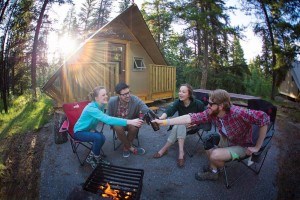
Parks Canada is now accepting reservations for its front country and backcountry campgrounds, with its online reservation system that opened April 1.
Jasper welcomes every camping style—from a one-person bivy tent to the largest motor home. Looking for a forested family camping spot close to town? Want a rugged backcountry experience below glaciated peaks? Jasper offers 11 vehicle-accessible campgrounds and 80 backcountry campgrounds. The park also has oTENTiks—part tent, part cozy cabin—with bunks and mattresses, a wood floor, table and chairs, and a front porch.
Reservations can be made for Whistlers, Wapiti, Wabasso or Pocohontas campgrounds by visiting www.reservation.parkscanada.gc.ca or calling 1-877-RESERVE (1-877-737-3783). All other roadside campgrounds operate on a first-come, first-served basis. To book your backcountry experience up to three months in advance, call 780-852-6177.
Spring wildlife update
Jasper’s bears will be waking up soon and leaving their dens for the valley bottoms in search of new vegetation and any animals that are weakened or have died over the winter.
Early season food is very important for these animals as they have been fasting for nearly six months. Hikers and bikers should watch for droppings and other signs, make noise on trails and carry bear spray.
Deer, elk, sheep and goats are all attracted to the roadsides while vegetation is greening up, so drivers are encouraged to keep their eyes peeled and drive with wildlife in mind.
As we enter bear season, brush up on bear safety:
Whether hiking or biking in the mountain parks, you may encounter a bear anytime, anywhere. The more you know about bear ecology and behaviour, and how to act in the event of a bear encounter, the safer you will be.
Bears are found throughout the park and can move long distances in a very short time period—just because a bear has been sighted on a particular trail does not mean it will be there an hour later.
Check for trail warnings and closures at www.pc.gc.ca/jasper before you hit the trail.
Stay alert on the trails:
- Make noise.
- Look for fresh bear signs.
- Travel in groups.
- Keep your dog on a leash.
- Carry bear spray and know how to use it.
- If you encounter a bear, give it LOTS of space.
Drive with care:
- Reduce your speed.
- Stay in your vehicle when watching roadside bears—do not follow a bear into the forest.
Safely store bear attractants:
- Keep food, garbage, recyclables, pet food and BBQs in bear-proof storage or hard-sided vehicles.
Report all bear sightings to Jasper National Park Resource Conservation (24 hrs) at 780-852-6155.
Mark your calendar for the next Wild Jasper Speaker Series
Do you like to keep an eye on the latest in research, monitoring, and wildlife management in Jasper National Park?
Join Dr. Rob Found from the University of Alberta on Thursday, April 16, at 7 p.m., at the Jasper Legion for the next instalment of the Wild Jasper Speaker Series, “Fortune Favours the Bold: The ecology of elk personality.”
The decline in elk movement has been linked to their increasing habituation to humans, and subsequent year-round exploitation of human-use areas like the Jasper townsite. Not all elk are habituated or use townsites—some individuals continue to migrate despite the higher risk of predation. Could this diversity of behaviour be explained by personality variation within elk herds? How can personality in elk even be measured?
Join us for an exploration of the personality of elk in Banff and Jasper national parks, and its implications for wildlife management.
Parks Canada, in collaboration with the Interpretive Guiding Association (IGA), presents this series aimed at keeping guides, residents and interested visitors informed and up-to-date on what is happening locally.
For more information, check out Jasper National Park’s Facebook (facebook.com/jaspernp) or Twitter (twitter.com/jaspernp) channels, or the IGA webpage (www.interpretiveguides.org/) in the coming weeks.
Parks Canada
Special to the Fitzhugh
